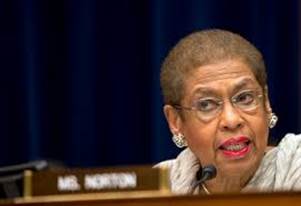DC Update: A Call To Reevaluate Lithium Batteries in Cargo Hold; White House Releases Infrastructure Fact Sheet
A report on government actions that could affect the remote-production industry
Story Highlights
It was another busy week in the nation’s capital, with more discussions on a variety of issues.

Del. Eleanor Holmes Norton asked for a Transportation Committee hearing on lithium-battery transport.
Lithium-ion batteries remained in the news. Most notably, Del. Eleanor Holmes Norton (D-DC), a member of the House Transportation and Infrastructure Committee, asked committee Chairman Bill Shuster (R-PA) and Ranking Member Peter DeFazio (D-OR) to hold a hearing on the potential dangers of transporting lithium batteries by air and U.S. efforts to ban electronics larger than cellphones in carry-on bags on commercial airplanes. In the request, Norton wrote, “Experts have pointed out that fires caused by lithium batteries are more easily detected within the cabin of an aircraft as opposed to within the cargo hold.” In the past, DeFazio introduced legislation banning lithium batteries on airplanes, and this request could reignite his interest and effort. DC Update will continue to follow the issue.
Although it was thought that the discussion on banning inflight electronics on flights from European countries was put to rest last week, the Department of Homeland Security announced this week that it has identified at least 71 airports, including some in Europe, where an electronics ban could be necessary for U.S.-bound flights. However, Secretary John Kelly insists that DHS is trying to mitigate risks from explosives planted on portable devices through other means.
Furthermore, on Monday, ICAO Council President Olumuyiwa Benard Aliu told airline CEOs that the organization has established a task force to review security risks from explosives planted in laptops and other portable devices. The task force is scheduled to complete its review in September. In the meantime, Aliu urged airlines to balance safety and security when considering whether passengers should store large electronics in checked baggage.
In other news, the Federal Motor Carrier Safety Administration decided June 2 to withdraw an advance notice of proposed rulemaking that would have raised insurance requirements for buses and trucks to match the rising costs of medical care. According to FMCSA, the agency withdrew the proposal because it did not have sufficient data to support the change. Many groups celebrated the decision, including the Owner-Operator Independent Drivers Association, calling it a “potentially devastating regulation” for small truck companies.
On Monday, the White House released an outline of its vision for Congress to split air-traffic–control operations away from the Federal Aviation Administration and into a nonprofit corporation. The plan is based on Shuster’s 2016 legislation, and, although some Republicans are cautiously supportive of the plan, it is already receiving backlash from Democrats in both the House and the Senate.
On Tuesday, Shuster announced that the Transportation and Infrastructure Committee will “possibly” mark up an FAA reauthorization bill later in the month.
On Wednesday, President Trump gave a speech on infrastructure in Ohio. Although the speech itself did not reveal new details on his plan, the White House released a fact sheet with a few more details.
Thursday marked the 115-day countdown until Department of Transportation appropriations runs out. FAA reauthorization expires in 115 days, and highway and transit policy is up for renewal in 1,211 days.
More hearings on FAA reauthorization and ATC privatization are expected next week. Stay tuned for next week’s DC Update.

